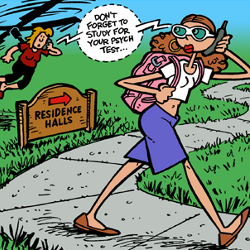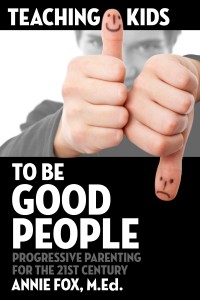|
|
April 9, 2013
I originally wrote a version of this article for TakePart.com where I contributed a weekly education post from Sept. 2012-Feb. 2013. Check out the rest of my articles there.
 If you're not planning on going to college with them, land that thing now! The late (truly) great Shel Silverstein made a truly brilliant point in his poem, Helping.
Some kind of help is the kind of help that helping’s all about
And some kind of help is the kind of help we all can do without!
He wasn’t talking about parents, but he could have been. Helping children is encoded in every parent’s DNA, so how could it be a bad thing?
As Shel pointed out, some help is not at all helpful, especially when the goal is to help kids become independent, fully functioning, young adults. (That is the goal, right?)
Imagine you’re the head teacher in your child’s Life Preparedness Training Course. Not far from the truth. So your long-term educational objective is to teach essential life skills, whatever you consider those to be. You’ve got 18 years to complete the curriculum before your child “graduates.” In terms of life-readiness, with which skills and character traits do you want your child to be equipped? Most parent include: independence, self-reliance, life-long learner, resilience, empathy, self-confidence, etc.
The long-term objectives may be clear, but the method…not always. In fact, sometimes our parental approach directly undermines our objectives. For example, suppose you prioritize “self-reliance,” but your 13 year old can’t for the life of him/her a) get ready for school in a timely fashion, and/or b) manage school challenges and after school obligations. Suppose also, that you have gotten into the habit of doing for your child what you say you want your child to learn to do for himself. Are you teaching your child self-reliance? Or something else?
Now before you head over to the comments section to remind me that not all children are capable of managing their time and responsibilities, let me agree with you. Not all children are 100 percent capable of balancing it all…yet. And some may never get close to managing their lives on their own. But all kids can learn to become more independent. When we require next to nothing of our kids until the time when they can do everything on their own, we are teaching them to be helpless.
Even a toddler can and should help put away her own books and toys. That’s not a “punishment” nor is it “mean.” Giving them responsibilities is a gift to them, part of our parenting legacy so that they can learn to do for themselves. Self-reliance is the objective. But when parents over-function (do much more than they ought to in relation to the child’s age and ability), then kids tend to under-function (do much less than they are capable of).
And what happens when those kids are at school and teachers expect them to take an active role in their own education? Sadly, it can create problems in individual classrooms and in the overall school climate. Teachers and administrators report that highly capable students (from highly educated parents) frequently lack motivation or initiative. Conversations with educators also indicate that kids whose parents tend to hover have more difficulty working and learning independently. (“They seem to need an awful lot of reassurance that they’re doing it ‘right.’ And even when you give it to them, they seem to be operating with a level of stress that makes it difficult for them to learn and apply what they’ve learned.”)
If you’d like to help your child on the journey toward independence (in school and in life), these tips offer a starting place:
1. Examine your assumptions about your parenting role in terms of helping vs. encouraging independence. If, for example, you believe that “A good parent always does everything for a child,” then you may be over-functioning to the detriment of your child’s development. Take some time to think about ways you can still be a good (even a great) parent without always doing everything for your child.
2. Talk to your child about your pride in his/her increasing maturity. Ask, “In what areas do you feel ready for more independence?” Listen with respect to what your child has to say. Tie together the concepts of added responsibility, added independence, and earned privileges.
3. Incorporate accountability into any discussion on independence and self-reliance. Hold your child accountable for keeping his agreements to family members, teachers, etc. Hold yourself accountable for keeping your agreements. (If that means you agree to not to interfere with homework, then take some deep breaths and stick to it.)
Our parenting journey is basically about teaching our kids to take care of themselves and providing them with age-appropriate opportunities to learn how to rely on their own judgment. If we parent well, eventually they won’t need us. But they’ll always need and use what’ve we taught them.

April 1, 2013
by Rick Ackerly, M. Ed.
Rick Ackerly is a nationally recognized educator and speaker with 45 years experience. He’s served as head of four independent schools, speaks to parent and school groups across the country and at education conferences. Rick is the author of The Genius in Every Child. Visit his blog to learn more about his innovative approach to education and parenting.
 Rick Ackerly knows about the genius in children
Last month, waiting at gate B22A at O’Hare a parent told me how frustrated she was with her teenage daughter.
“I’ve tried everything with Julie. I read the parenting books and tried it all, and it’s just not working.”
“What did you try?” I asked.
“You know. I confronted unacceptable behavior; I acknowledged her feelings while insisting on what I wanted. I tried not take it personally, but nothing worked.”
“How do you know it’s not working?” I asked.
She looked at me as if I were either goading her or simply an idiot. “She keeps doing the very things I tell her not to do.”
“With teenagers,” I said. “That is not a sign that it is not working. Adolescents are not constituted to obey. They are wired to disobey. Well, not exactly disobey. They are wired to make their own decisions—not necessarily good ones, but to make them. It is essential for their survival that they practice making decisions and noticing results.”
She, of course, was not relieved to hear this. Raising teenagers can be a nerve- wracking experience, and I have never known a parent who is in the throes of this enterprise to be easily pacified. And anyway, I never got the chance to attempt further consolation, because the boarding process began just as I was delivering my shocking message that “They are wired to disobey.”
I wish I had had the time to tell her about a conversation I had with 18-year-old Allison as I drove her home from a basketball game one Wednesday evening several years ago.
“I listen to my father,” said Allison, “because I have found that he tells me things that turn out to be true. Like ‘Never go out without money,’ he says.”
Allison had needed someone to talk to. Last Saturday night there had been a party where some of her classmates got drunk and trashed the house of a classmate.
She went on: “I wish I could talk to the parents of my friends and tell them how to talk to their kids. I wish they would tell them things like ‘Never go out without money.’ There we are at Starbucks and they’re all, ‘Allison, can you pay for this? I didn’t bring any money,’ and I go, ‘Sure.’ But it get’s annoying. They do pay me back, but it’s annoying. Parents ought to be careful what they tell their kids, so that when they give them advice, the kids will listen. What those kids did to that house was gross.”
“But you don’t always do what your father says, do you?”
“No, but when he talks, I do listen. Sure, it makes me mad when he tells me to get off Facebook and to start doing my homework, but I know he is telling me the right thing. That’s the point. I know it is the right thing for him to tell me. It makes him mad when I don’t do it right away, but that’s the way it’s supposed to be between parents and their teenagers. I know he’s right. I just have to do it myself. He has become like an authority. When he speaks I listen.”
Don’t all parents want to become “like an authority?” Listen to Allison. She is on to something very important.
Until age five, it is important for parents to back up their statements—with force if necessary. If a parent says: “No, you can’t have a candy cane before dinner,” then it is very important that the child does not eat a candy cane before dinner. “Eight o’clock bedtime” has to mean: In bed by eight. Period. If a parent says it’s bad for you and then let’s you do it, how can you trust such a parent? Why should a child listen to such a parent?
However, by age thirteen, the human brain is working to develop and consolidate the part of the brain that makes decisions—the pre-frontal cortex. By 18 the teenage brain has all the circuitry of an adult brain, but not enough practice. They know drinking to excess is not good for you, and that trashing a house is very bad, but the adolescent mind is open to other possibilities which must be tested to be “known.” Close relationships with adult authorities are important for helping kids know which end is up. If kids listen to parents it is because parents have proven that they are authorities worth listening to.

March 22, 2013
 Please don't feed the monkeys I sat and waited for my friend to meet me for lunch at a local place. I was trying not to do anything else. I was not succeeding.
When you’re waiting for someone to meet you, or call, or return a text, it’s easy to think fuel-ish thoughts (the kind that adds to anxiety):
Where is she already?
12:30. Wasn’t this the time we said?
It was for Wednesday, right?
Today is Wednesday, isn’t it?
Or were we supposed to meet Thursday?!
Is she trying to call me?
Is my phone on? (Yes!)
Should I check again? (Yes, it’s on!)
Did she forget?
Did she have an emergency?!
Is she all right?!!
All that mental garbage, piling up, muzzling my good spirits of ten minutes ago as I congratulated myself for finding parking so close-by… and with 90 minutes still on the meter!
But now fuelish spores exude from my monkey mind, infecting this happy camper. Downer thoughts. Not worth a damn. Powerless to alter current reality:
I am sitting alone on a wooden bench in a restaurant. My friend, who agreed to meet me for lunch is now… 22 minutes late. Make that 23. Whatcha gonna do about that, monkey mind?
Grass wallpaper. Potted palms. Bamboo fountain. Ah serenity. Except for the noisy diners. But actually, they’re perfect. From every part of the room happy folks enjoy a mid-day break with good food and good company. Eight friends over there (a birthday celebration, perhaps) swap personal updates and laugh it up.
I wish I was sitting with my friend enjoying the same. But she’s not here… yet.
I should just call her! Damn. I don’t have her number!
But you know what? That’s fine. Really it is. She’ll get here when she does. And in the meantime, I’m taking notes for this blog. Trying not to do anything else. Because nothing else is needed. It’s nice to sit here.
Are we out of milk? I’d better…
Shut up! No need to think about what I could or should be doing instead of waiting here. So I’ll just sit and breathe. In. Out. Ohmm. Present moment… Wonderf….
Maybe I made the mistake!
Maybe my friend is waiting for me somewhere else and wondering if I blew her off?
I’m hungry.
Do I grab a table and order something?
Do I want to buy lunch for myself if she doesn’t show?
We’ve got food at home and I’m 10 minutes away.
I don’t need to spend the money. I don’t think I should…
Sigh. Anyone want a monkey?

February 28, 2013
As a published author, of course I know about book tours. Not that I’ve ever actually been on one, but I’ve attended other authors’ events at Book Passage. So, yeah. I understand the concept. What I didn’t get, until recently, is “What’s a blog tour?” Turns out it’s pretty much the same thing as a book tour without the books, the bookstore, or the fans eager to buy an autographed copy.
 Not all teachers are parents, but all parents are teachers Since I’ve got a new book I’m rather proud of and zero publicity budget, starting today, I’m on the (virtual) road with the Teaching Kids to Be Good People Blog Tour (Feels like we need a theme song. I’ll work on it.) At each of the nineteen stops along the tour, there is no stump speech. You, my dear readers, will be treated to totally new and thought provoking content to help us 21st century parents raise nice kids who also do good in the world.
Here’s where you can find me and when:
 I know it's a virtual tour, but I want this bus! Teaching Kids to Be Good People Blog Tour Itinerary
Got the T-shirt:
February 28 – Suzanna Narducci’s blog at TweenParent.com
February 28 – Heather Chauvin’s blog (video interview)
March 5 – Kelly Hirt’s blog My Twice Baked Potato
March 7 – Jean Tracy MSS’ Parenting Skills Blog
March 10 – Jeanne Demer’s The Ruby Books
March 16 – Rick Ackerly’s blog at Genius in Children
March 18 – Margit Crane and Barbara Dab’s Good Enough Parenting Radio Show
March 18 – Sharon Silver ‘s blog at Proactive Parenting
March 19 – Families Magazine Southwest (UK)
March 20 – Sue McNamara at 6seconds.org
March 21 – Kristen Ploetz’ Little Lodestar
March 27 – AK Stout & Deb Evans‘ Social Geek Radio 6 pm (PT)
March 28 – Bruce Sallan’s #DadChat “Doing the right thing is good karma” (on Twitter) 6 PM (PT) Enter TweetChat room
March 29 – Lynnee Jimenez’s ClubChicaCircle.com
April 1 – Melissa Wardy’s blog at PigtailPals
April 8 – Keith Rispin’s Parenting Old School blog as well as Keith’s Ed Tech blog
April 15 – Carrie Goldman’s blog Portrait of an Adoption
April 19 – Sarah Newton’s blog at Sarah Newton.com
April 29 – Dr. Laura Markham’s blog at Aha Parenting
A big thank you to all my blog tour hosts. These are top-notch folks. All of them are authors, educators, clinicians, and/or parent coaches who do truly excellent work supporting kids, parents, and families. I’m honored to be on the same team with each of them and I encourage you to explore their books and services. We’re all here together to help each other as we help our kids.
OK, the blog tour starts now. Wait!! How’s my hair look? Oh, right. It doesn’t matter. :O))
Happy Parenting! (And if you feel the urge, please sign the guest book.)
 We're in this together!
 — Older Posts »
| |

















